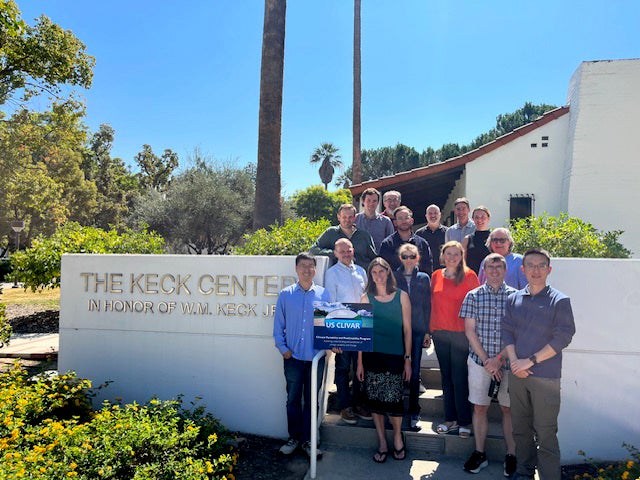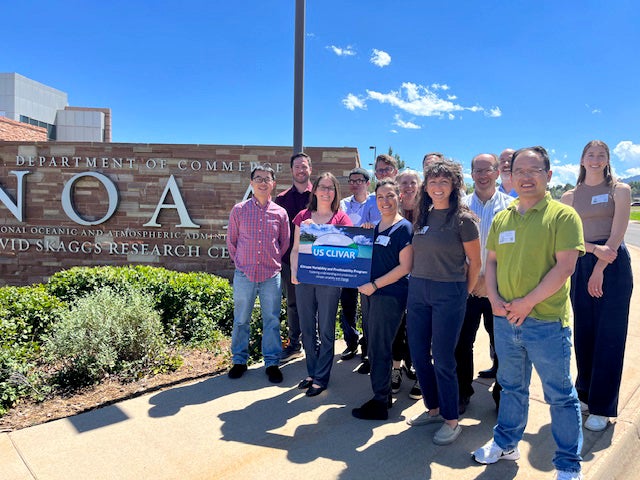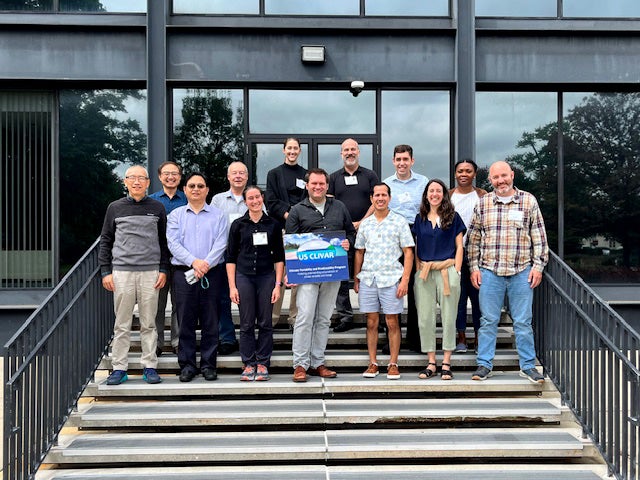2025 Call for US CLIVAR Panel Members
Click here to apply
Deadline to apply: March 7, 2025
The US Climate Variability and Predictability (US CLIVAR) Scientific Steering Committee (SSC) seeks qualified individuals to serve on its three subsidiary panels:
- Phenomena, Observations, and Synthesis (POS) Panel
- Process Study and Model Improvement (PSMI) Panel
- Predictability, Predictions, and Applications Interface (PPAI) Panel
What role do the panels play in US CLIVAR?
The panels identify research gaps and set priorities, formulate implementation strategies, catalyze and coordinate activities, and collaborate with US and international partners to advance the progress of the climate research community. It is an exciting time to join the US CLIVAR panels as they work on planning activities to address the goals and research challenges articulated in the US CLIVAR Science Plan and to contribute to the UN Decade of Ocean Science for Sustainable Development and the US Priority on Earth System Predictability. US CLIVAR aims to foster understanding and prediction of climate variability and change on intraseasonal-to-centennial timescales through observations and modeling with emphasis on the role of the ocean and its interaction with other elements of the Earth system and to serve the climate community and society through the coordination and facilitation of research on outstanding climate questions. Key research challenges include decadal variability and predictability, climate and extreme events, polar climate changes, climate and marine carbon/biogeochemistry, and climate at the coasts.
What expertise is each panel seeking in applicants?
Each panel seeks members to enhance current strengths while adding expertise in new areas. Qualified applicants are expected to represent the broader interests of the research community, be willing and able to engage in scientific as well as programmatic discussions to advance panel activities, and work with other members of US and international climate science communities to foster collaboration.
- The US CLIVAR POS Panel seeks new panelists with expertise in satellite and/or in situ observations of the ocean, atmosphere, and cryosphere, or in modeling to synthesize such observations. In particular, expertise is sought in one or more of the following areas: (a) satellite observations, including established, novel, and/or upcoming missions; (b) biogeochemical cycles and their interactions with the climate system, at the global scale and/or as related to marine carbon dioxide removal (mCDR); (c) marine life and its connections to climate; (d) Southern Ocean circulation and links with climate; (e) artificial intelligence (AI) in the context of data assimilation, reanalysis products, or data-driven models of climate processes. Candidates with expertise spanning multiple components of the climate system (ocean, atmosphere, cryosphere, and biosphere) are encouraged to apply. The POS Panel has two available seats.
- The US CLIVAR PSMI Panel seeks new panelists with expertise in one or more of the following areas: (a) air-sea interaction and the air-sea transition zone; (b) physical-biogeochemical interactions; mesoscale and sub-mesoscale controls on biology; (c) aerosol-cloud-climate interactions; (d) coastal ocean processes and the land-ocean interface. Scientists with expertise in high-resolution Earth system modeling (including model or parameterization development), observational process studies, or the application of AI/ML methods for process understanding are particularly encouraged to apply. The PSMI Panel has two available seats.
- The US CLIVAR PPAI Panel seeks new panelists with a strong interest in advancing scientific collaboration and coordination with the goals of mainstreaming climate information for all Americans by improving scientific knowledge, prediction skill, and decision-making on subseasonal to multidecadal time scales. Specific scientific expertise is sought in one or more of the following areas: (a) hydroclimate and water resources' prediction and predictability on subseasonal-to-decadal timescales; (b) predictability and/or prediction applications of ocean variability and change, including extremes; (c) expertise in applications of climate science in areas of disaster risk reduction, insurance/reinsurance, and/or health impacts; (d) practitioners of climate applications and predictions. The PPAI Panel has three available seats.
Who can apply?
The US CLIVAR SSC seeks scientists with a US affiliation from the early career to late career stages within academia, research institutions, government organizations, non-government organizations, and the private sector. A wide swath of affiliations, career stages, and experience broadens representation of the US Earth science community and strengthens our panels by offering myriad viewpoints. US CLIVAR deeply values people from all backgrounds and the strength they bring to our panels; applications from people across all identities are strongly encouraged.
The SSC review of applications and selection of new members will take into account the match with expertise sought for each panel.
What are the benefits of being a panel member?
Participating on a panel provides an opportunity to:
- Learn about the broader climate sciences beyond your own area of expertise;
- Share your knowledge and perspectives in evaluating science gaps and infrastructure needs, formulating research priorities, and scoping new activities;
- Lead and/or help organize collaborative community activities, including town halls, conference sessions, webinar series, workshops, working groups, and the drafting of white papers and reports;
- Expand your network of climate scientists, practitioners, and agency program managers; and
- Gain leadership experience and visibility within the climate science community.
Read more about previous panel members experience through testimonials here.
What is the time commitment?
Panelists serve for a term of four years.
- Monthly meetings: Each panel convenes virtually for an hour each month. Meetings often lead off with an invited webinar presentation (see previous webinars here) on a priority science topic as part of an ongoing panel webinar series to inform the panel discussion, followed by a panel business session that includes read-outs from members on ongoing and new activities. Work is done primarily between meetings with communication via email and online shared documents. Monthly time commitment is typically ~2-3 hours, but can periodically vary depending on the activities that panel members undertake.
- Annual Meetings: Panel members meet in person each year. In even years, they attend a 2-day panel meeting held in the summer or early fall. In odd years (including 2025), they attend the US CLIVAR Summit, a 2.5-day meeting of all of the panels, the US CLIVAR SSC, sponsoring agency program managers, and invited experts. These meetings review current and pressing science topics and inform priorities and action items for the subsequent year. In addition to the meeting and travel days, the panel members spend time organizing the sessions that they co-lead and drafting text after the meeting for the resulting published report. The US CLIVAR Project Office supports travel for members to attend the annual meetings, covering airfare, lodging, per diem, and ground transportation.
What is the application process?
The application process requires a statement of interest that includes relevant experience in the panel topics (less than 500 words) and the upload of a 2-page CV with relevant work and publications listed. All applications must fill out and submit the Google form with the above-mentioned document by March 7th to be considered.
The SSC review of applications and selection of new members will take into account the match with expertise sought for each panel. The SSC will also consider institutional affiliations, career stages, and backgrounds to address balance across panel membership. Application review will begin following the application deadline of March 7th, and applicants will be notified of SSC selection decisions by mid-April.
What training is provided for this position?
All new panel members will receive a two-hour orientation given by the US CLIVAR Project Office that covers the mission and goals of the program, the organizational structure, the scope and priorities of each panel, and the activities and products generated by the panels. The US CLIVAR Project Office and panel co-chairs provide additional support and instruction to help members acclimate to their new role in the first year.
Click here to apply



